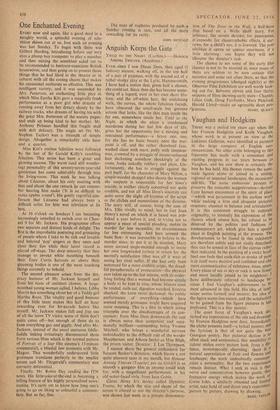One Enchanted Evening
EVERY now and again, like a good deed in a naughty world, a splendid evening of tele- vision shines out at us. Just such an evening was last Sunday. To begin with there was Gilbert Harding, introducing before our very eyes a plump boy trumpeter to play a mambo; and then mixing the sensiblest salad yet to be recommended to beetroot-conscious British housewives; and then going on to present those things that he had liked in the theatre or in cabaret with all the cooing charm that makes his occasional outbursts so effective. This was intelligent- variety; and it was succeeded by Mrs. Patterson, an enchanting little play in which Miss Eartha Kitt gave a magically fresh performance as a poor girl who dreanis of running away from her dreary. shanty by the railway tracks, who dreams of having tea with the great Mrs. Patterson of the society pages; and ends up being kind to her mother. Mr. Anthony Pelissier handled this fragile stuff with deft delicacy. The single set (by Mr. Stephen Taylor) was a triumph of simple design. Altogether a remarkably able hour and a quarter.
Miss Kitt's restless felinities were followed by the last of Sir Gerald Kelly's rambling felicities. This series has been a great and glowing success. The warm (and still wonder- ing) personality of this seventy-seven-year-old gentleman has come admirably through into the living-room. This week he was talking about Cezanne, about his only meeting with him and about the one remark be can remem- ber hearing him make ('It is so difficult to make apples round'). His gently regretful con- fession that Cezanne had always been a difficult artist for him was television at its best, .
At 10 o'clock on Sundays I am becoming increasingly impelled to switch over to Chan- nel 9 for Mr. Jackson. His programme offers two separate and distinct kinds of delight. The first is the improbable posturing 'and grimacing of people whom I take to be rich and lovable and beloved 'pop' singers as they open and close their lips while their latest record is played off-stage. The deep sincerity that they manage to invoke while mouthing beneath their Tony Curtis haircuts or above their gleaming bodies is one of the most touching things currently to behold.
The second pleasure arises from the dry, crazy humour of Mr. Jackson himself and from his team of assistant clowns. A large- mouthed young woman called. I believe. Libby Morris has something about her of a Teddy girl Martha Raye, The vitality and good humour of this little team makes this half an hour rewarding even for hit-parade haters like myself. Mr. Jackson makes full and free use of all the latest TV tricks; some of them don't quite come off—but enough of them do to keen everything gay and giggly. And after Mr. Jackson, instead of the usual unctuous fiddle- faddle linking irritatingly disconnected shots from various films which is the normal pattern of Portrait of a Star (the cinema's 15-minute commercial), a blissful few moments with Mr. Magoo. This wonderfully underscored little grotesque translates perfectly to the smaller screen and Mr. Fitzgerald's commentary was correctly deferential.
Finally, Mr. Robin Day reading the ITN news. His little-joke-at-the-end is becoming a telling feature of his highly personalised news- casting. It's early yet to know how long one's going to go on liking so colourful a commen- tary. But so far, fine. The state of euphoria produced by, such ta Sunday evening is rare, and all the more rewarding for its rarity.
JOHN METCALF


































 Previous page
Previous page